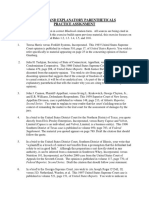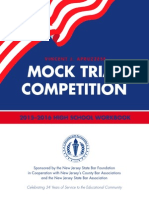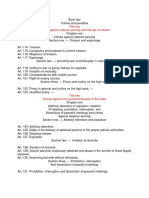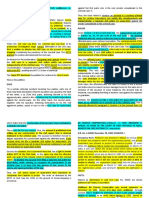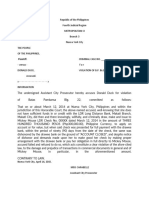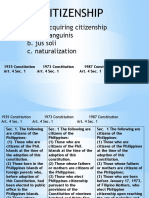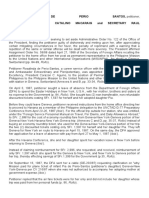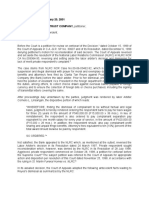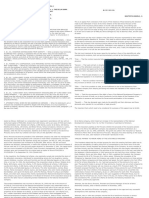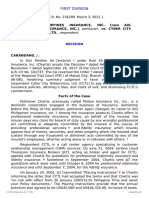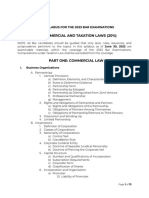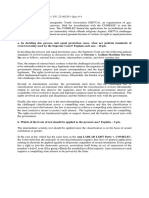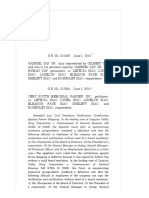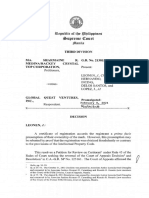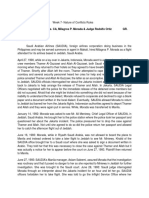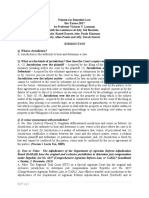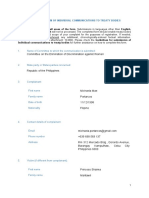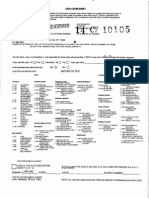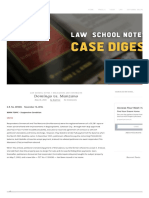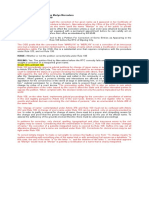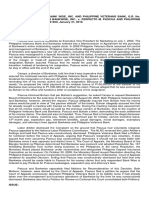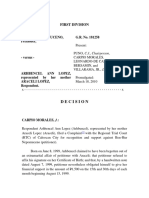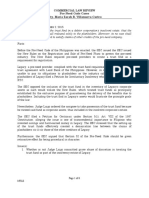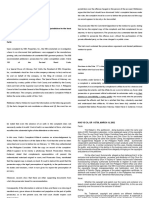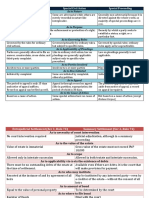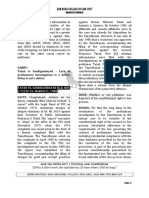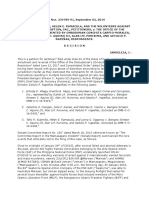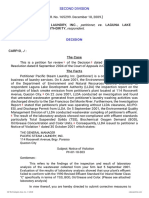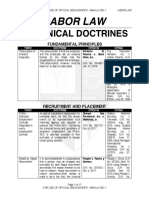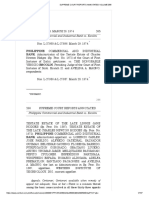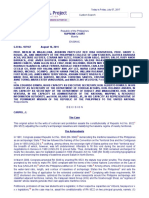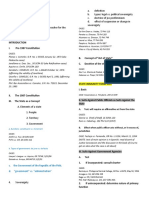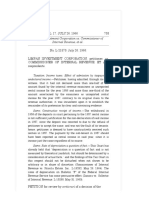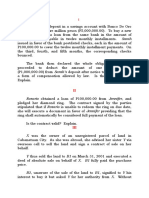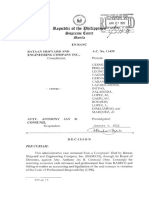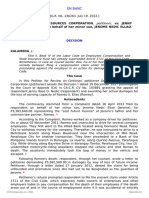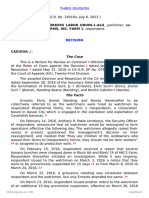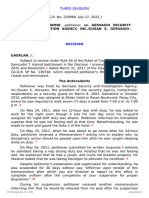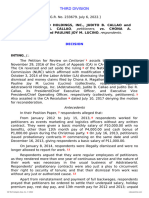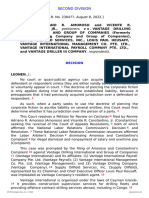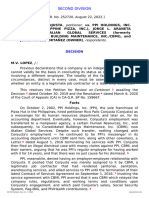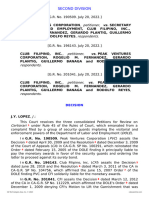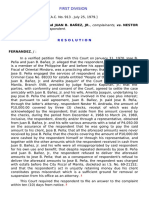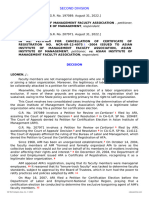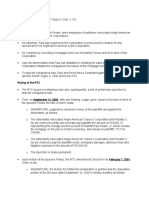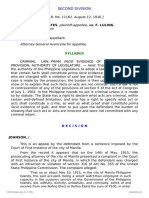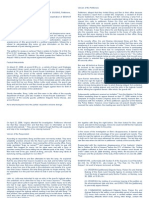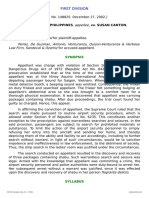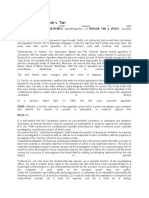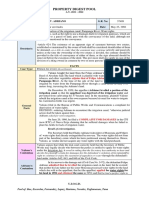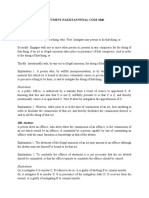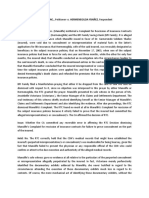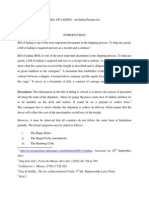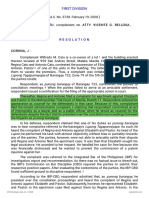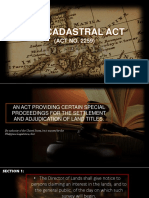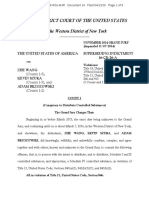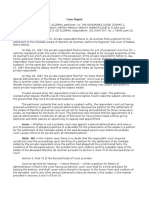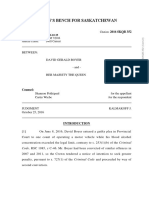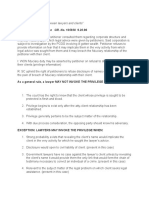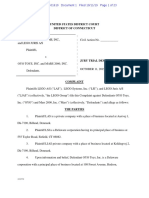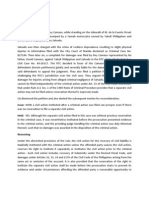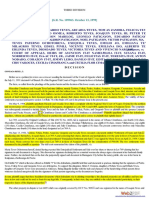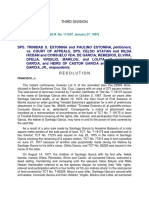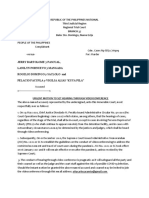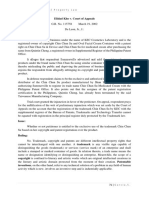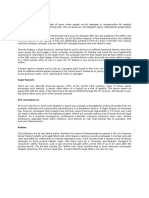Bantillo Vs IAC
Bantillo Vs IAC
Uploaded by
Arren RelucioCopyright:
Available Formats
Bantillo Vs IAC
Bantillo Vs IAC
Uploaded by
Arren RelucioOriginal Title
Copyright
Available Formats
Share this document
Did you find this document useful?
Is this content inappropriate?
Copyright:
Available Formats
Bantillo Vs IAC
Bantillo Vs IAC
Uploaded by
Arren RelucioCopyright:
Available Formats
Bantillo vs.
IAC
Facts:
This case originated from a Complaint for Reconveyance filed by
petitioner Rosita Zafra Bantillo against respondent Elsa Maniquis-
Sumcad with the Court of First Instance of North Cotabato.
In the Complaint, it was alleged that petitioner Bantillo (plaintiff
below) "is the surviving heir" of the deceased spouses, Candido
Zafra and Maria Pimentel Zafra; that the Zafra spouses had
occupied and possessed Lot No. 63 "under claim of ownership since
1950;" that petitioner, "as surviving heir and in representation of the
heirs of [the Zafra] spouses," had been in open and continuous
possession and occupation of Lot No. 63 ever since the death of the
spouses; that by virtue of Original Certificate of Title No. P-35267
issued in the name of respondent Sumcad, respondent had claimed
ownership of the disputed land and had sought petitioner's removal
therefrom; and that respondent had rejected demands to reconvey
the land to petitioner. c
Respondent Sumcad (defendant below) filed a "Motion for Bill of
Particulars" 3 in response to the complaint. In that motion,
respondent Sumcad requested that petitioner Bantillo be directed
by the court: (a) "to specify what kind of surviving heir she is . . .;"
and (b) "to specify by what right or authority she represents the so-
called 'heirs of the spouses Candido Zafra and Maria Pimentel Zafra'
. . . and [to show] the papers under which she is authorized to
represent them in court, and also [to specify and identify] these
other heirs by name and the nature of their heirship
Petitioner Bantillo questioned the propriety of respondent Sumcad's
motion. Petitioner Bantillo alleged that the matters mentioned in
the "Motion for Bill of Particulars" were not essential to enable
respondent Sumcad to file an answer to the complaint, that such
matters are not proper subjects of a motion for bill of particulars.
In response to a motion for a bill of particulars, regarding the complaint
filed by the plaintiff, the latter's counsel manifested in open court that she
was willing to specify the names of the heirs allegedly being represented
by plaintiff Rosita Bantillo as well as to submit the special power of
attorney executed by said heirs in plaintiff's favor.
Subsequently, counsel for the defendant filed a motion to dismiss. In
support of the motion, it was pointed out that the plaintiff had not as yet
submitted her amended complaint as directed by the court. Neither had
the plaintiff complied with the July 5, 1982 Order of said court directing
her to specify the other Bantillo heirs and to produce the special power of
attorney authorizing her to represent their heirs in the action.
Plaintiff filed an Opposition to the Motion to dismiss. Attached to the
Opposition was an amended complaint.
Reacting to the Opposition, defendant on July 5, 1983 interposed a
Rejoinder with Motion to Strike Out/Dismiss Plaintiff's Pleadings, pointing
out therein that the plaintiff's compliance with the court's Order was
made more than one year from the issuance of the said Order. Invoking
Section 1(c), Rule 12 of the Rules of Court which grants a party only a ten-
day period within which to respond to a bill of particulars, the defendant
denounced plaintiff's tardy compliance as 'an outright sham and a mere
ploy intended to outsmart this Honorable Court and the parties.'
On August 2, 1983, the court a quo issued the Order which is the subject
of this present appeal. In this Order the lower court found the Motion to
Strike Out/Dismiss Plaintiff's Pleadings, filed by the Defendant's Counsel
meritorious, grants the same and orders the dismissal of the complaint
and the striking out of the amended complaint, with costs.
Issue: W/N the Motion for Bill of Particulars, under Sec.1 Rule 12, was proper – YES
Ruling:
Petitioner Bantillo contests the application in this case of Section 1
of Rule 12 of the Revised Rules of Court, alleging once more that the
matters mentioned in respondent Sumcad's disputed motion are
"not within the scope and ambit of a bill of particulars." Petitioner
also alleges that "there was really no bill of particulars required of
[petitioner]" by the trial court. Furthermore, it is contended that
Rule 10 of the Rules of Court is the applicable provision here.
"Section 1. Motion for bill of particulars. — Before responding to a
pleading or, if no responsive pleading is permitted by these rules, within
ten (10) days after service of the pleading upon him, a party may move
for a more definite statement or for a bill of particulars of any matter
which is not averred with sufficient definiteness or particularity to enable
him properly to prepare his responsive pleading or to prepare for trial.
Such motion shall point out the defects complained of and the details
desired.
Under this Rule, the remedy available to a party who seeks
clarification of any issue or matter vaguely or obscurely pleaded by
the other party, is to file a motion, either for "a more definite
statement" or for a bill of particulars. An order directing the
submission of such statement or bill, further, is proper where it
enables the party movant intelligently to prepare a responsive
pleading, or adequately to prepare for trial.
The title of the (original) Complaint in Civil Case No. 161 expressly
stated that petitioner Bantillo had then brought suit " for herself and
in representation of the Heirs of Spouses Candido Zafra and Maria
Pimentel Zafra." In paragraphs 2 and 3 of the Complaint, petitioner
Bantillo alleged her capacity personally to maintain the judicial
action for reconveyance, manifesting that she is the "surviving heir"
of the Zafra spouses, the alleged original owners of the land under
litigation. The Court notes, however, the absolute lack of allegations
in the Complaint regarding the petitioner's capacity or authority to
bring suit in behalf of her alleged co-heirs and co- plaintiffs.
On this matter, Section 4 of Rule 8 of the Revised Rules of Court
specifically provides:
"Section 4. Capacity. — Facts showing the capacity of a party to sue or be
sued or the authority of a party to sue or be sued in a representative
capacityor the legal existence of an organized association of persons that
is made a party, must be averred. A party desiring to raise an issue as to
the legal existence of any party or the capacity of any party to sue or be
sued in a representative capacity, shall do so by specific denial, which
shall include such supporting particulars as are peculiarly within the
pleader's knowledge."
Petitioner Bantillo having failed to allege in her Complaint a factual
matter which, under the Rules, must be alleged or pleaded,
respondent Sumcad was not unjustified in moving for clarification of
such matter. Knowledge of the identity or identities of petitioner's
alleged co-heirs and co- plaintiffs and, more importantly, of the
basis of petitioner's claimed authority to represent the latter, would
obviously be useful to respondent in the preparation of a responsive
pleading; respondent Sumcad should be given sufficient opportunity
intelligently to contest these matters and possibly to raise the same
as issues in her Answer. The Court hence believes that the "Motion
for Bill of Particulars" filed by respondent Sumcad was not improper.
The first paragraph of the disputed 5 July 1982 Order (quotedsupra,
pp. 3-4) of the trial court in Civil Case No. 161 states that petitioner
Bantillo, through counsel, had agreed to specify the names of her
alleged co-heirs and to submit a special power of attorney
authorizing her to represent said co-heirs in the action for
reconveyance. Petitioner's counsel was also directed to furnish
respondent's counsel with a copy of the corresponding
"amendments.
As pointed out by petitioner in her Memorandum, the trial court did
not in its Order of 5 July 1982 expressly direct petitioner Bantillo to
submit a bill of particulars. What was in fact required of petitioner
was an amended complaint, which would incorporate the
"amendments" mentioned in the first paragraph of the Order. This
singular circumstance, however, does not preclude application in
this case of Rule 12, Section 1(c) of which provides
(c) Refusal. — If an order of the court to make a pleading more definite
and certain or for a bill of particulars is not obeyed within ten (10) days
after notice of the order or within such other time as the court may fix,
the court may order the striking out of the pleading to which the motion
was directed or make such other order as it deems just. It may, upon
motion, set aside the order, or modify it in the interest of justice."
Under the above provision, the court may upon motion in
appropriate cases direct the adverse party (a) to file a bill of
particulars, or (b) to make the pleading referred to in the motion
more definite and certain, either by amending or supplementing the
same. The trial court's disputed Order of 5 July 1982 falls squarely
within the second category. As the Order itself did not specify the
period for compliance with its terms, petitioner Bantillo was bound
to comply therewith within ten (10) days from notice thereof, i.e., on
or before 15 July 1982.
Petitioner Bantillo's reliance on Section 2, Rule 10 of the Revised Rules
of Court — which allows amendment of pleadings "once as a matter of
course at any time before a responsive pleading is served. — is
misplaced. That provision does not apply in situations where it is the
court itself that orders a party litigant to amend his or her pleading.
Where, as in the case at bar, the trial court orders the amendment
after a motion for a bill of particulars has been filed by the adverse
party and heard by the court, the applicable provision is Section 1 of
Rule 12 of the Rules of Court: the amended pleading must be filed
within the time fixed by the court, or absent such a specification of
time, within ten (10) days from notice of the order.
The record shows that petitioner Bantillo filed her Amended Complaint
with the trial court only on 22 June 1983, or more than eleven (11)
months after the reglementary period of ten (10) days had expired.
The trial judge found no merit in the reasons advanced by petitioner
Bantillo for such delay and dismissed the Complaint, declaring that an
"unreasonable length of time" had already elapsed.
There is of course no question that petitioner's Amended Complaint
was filed out of time. Nonetheless the Court believes that in the
interest of substantial and expeditious justice, the Amended Complaint
should not have been dismissed and ordered stricken from the record.
In the first place, the amendment of the original complaint consisted
simply of deletion of any reference to "other heirs" of the Zafra
spouses as co-plaintiffs in the action for reconveyance; petitioner, in
other words, clarified that she alone was plaintiff and heir and
therefore was no longer suing also in a representative capacity. This
amendment, in the second place, imposed no substantial prejudice
upon respondent Sumcad and was thus formal in character. As a
matter of fact, Sumcad had not yet filed any responsive pleading at all
and had not disclosed the nature and basis of her own claim of
ownership of Lot No. 63. The issues had not yet been joined. Thirdly,
the Amended Complaint was already before the trial court and it could
have and should have proceeded with the case. c
Alternatively, if it be assumed that the Amended Complaint was
properly dismissed, such dismissal should not, for the same reasons of
substantial and expeditious justice, be deemed as having the effect of
an adjudication upon the merits and hence should be regarded as
without prejudice to petitioner's right to refile her complaint in its
amended form. Under this alternative hypothesis, to require petitioner
to refile her complaint in a new action, would appear little more than
compelling her to go through an idle ceremony. Under either view,
therefore, the trial court should have admitted the Amended Complaint
instead of striking it off the record. Public policy favors the disposition
of claims brought to court on their merits, rather than on any other
basis.
You might also like
- Signals and Explanatory Parentheticals QuizDocument2 pagesSignals and Explanatory Parentheticals QuizBijan Mohseni0% (1)
- Mock Trial Case File 2015-2016Document116 pagesMock Trial Case File 2015-2016srijaNo ratings yet
- Egao v. CADocument3 pagesEgao v. CAChristine Pia GerzonNo ratings yet
- Cir Vs Campos RuedaDocument4 pagesCir Vs Campos RuedaAljay LabugaNo ratings yet
- Title One Crimes Against National Security and The Law of NationsDocument12 pagesTitle One Crimes Against National Security and The Law of NationsLouisa FerrarenNo ratings yet
- Rule 65 DigestsDocument14 pagesRule 65 DigestsMJ ApolinarNo ratings yet
- BP 22 SampleDocument2 pagesBP 22 SamplePaolo MagarinNo ratings yet
- International Law of The Sea PDFDocument6 pagesInternational Law of The Sea PDFJoshua OuanoNo ratings yet
- Phil. Constitution - CitizenshipDocument21 pagesPhil. Constitution - CitizenshipsejboyNo ratings yet
- Mighty Corporation Vs Ej GalloDocument56 pagesMighty Corporation Vs Ej GalloJanelle TabuzoNo ratings yet
- Security and The Law of Nations: Title One: Crimes Against NationalDocument5 pagesSecurity and The Law of Nations: Title One: Crimes Against NationalRon ValdezNo ratings yet
- Labor DigestDocument10 pagesLabor DigestRedd Lapid0% (2)
- 26 de Perio Santos vs. MacaraigDocument10 pages26 de Perio Santos vs. Macaraigchristopher d. balubayanNo ratings yet
- OPT, Excise, DST, Tax RemediesDocument11 pagesOPT, Excise, DST, Tax RemediesLou Brad Nazareno IgnacioNo ratings yet
- 2023.admin Law - Syllabus and Case List - Part 1Document2 pages2023.admin Law - Syllabus and Case List - Part 1LoNo ratings yet
- 19 Prudential Bank V ReyesDocument10 pages19 Prudential Bank V ReyesGie CortesNo ratings yet
- 2.pirovano vs. de La RamaDocument10 pages2.pirovano vs. de La RamaNympa VillanuevaNo ratings yet
- Chartis Philippines Insurance Inc. v. Cyber20211206-12-5nzwjyDocument18 pagesChartis Philippines Insurance Inc. v. Cyber20211206-12-5nzwjyReah Shyne RefilNo ratings yet
- Commercial Law Bar SyllabusDocument8 pagesCommercial Law Bar SyllabusJM EnguitoNo ratings yet
- BIR TRAIN BriefingDocument223 pagesBIR TRAIN BriefingRealliance PHNo ratings yet
- Digest By: AME AltisoDocument5 pagesDigest By: AME AltisoenggNo ratings yet
- Roman Superhighway, Balanga City, Bataan 2100Document1 pageRoman Superhighway, Balanga City, Bataan 2100mart09211991No ratings yet
- Quiz No.4 - Ryan Paul Aquino - SN22-00258Document2 pagesQuiz No.4 - Ryan Paul Aquino - SN22-00258RPSA CPANo ratings yet
- Air Transportation Office vs. RamosDocument10 pagesAir Transportation Office vs. RamosLara MagultaNo ratings yet
- Yap Vs Siao G.R. No. 212493 June 01 2016Document21 pagesYap Vs Siao G.R. No. 212493 June 01 2016Jose Cristobal Cagampang LiwanagNo ratings yet
- Reynaldo Hayan Moya, Petitioner, vs. First Solid Rubber Industries, Inc., RespondentDocument3 pagesReynaldo Hayan Moya, Petitioner, vs. First Solid Rubber Industries, Inc., RespondentAllyza RamirezNo ratings yet
- Mr. Gulaman CaseDocument15 pagesMr. Gulaman CaseGladys VilchezNo ratings yet
- Saudi Arabian Airlines vs. CA, Milagros P. Morada & Judge Rodolfo Ortiz GR. 122191Document6 pagesSaudi Arabian Airlines vs. CA, Milagros P. Morada & Judge Rodolfo Ortiz GR. 122191Jennica Gyrl G. DelfinNo ratings yet
- 2017 Pointers in Remedial LawDocument32 pages2017 Pointers in Remedial LawCentener CalcetaNo ratings yet
- PUAS Online Form E PortarcosDocument6 pagesPUAS Online Form E PortarcosMichaela T PortarcosNo ratings yet
- Foreign Investment ActDocument3 pagesForeign Investment ActNieves GalvezNo ratings yet
- Consolidated SPECPRODocument12 pagesConsolidated SPECPROGiselle GaudielNo ratings yet
- Paysys Intl - Complaint Software Copyright Trade Secrets PDFDocument41 pagesPaysys Intl - Complaint Software Copyright Trade Secrets PDFMark JaffeNo ratings yet
- Civ Cases Digest CompilationDocument37 pagesCiv Cases Digest CompilationOlivia SamarNo ratings yet
- Spec ProDocument34 pagesSpec Prokero keropiNo ratings yet
- Digest Perfecto Pascuavs. Bank Wise Inc. and Veterance BankDocument2 pagesDigest Perfecto Pascuavs. Bank Wise Inc. and Veterance BankrheaNo ratings yet
- Ben-Hur Nepomuceno, Petitioner, G.R. No. 181258: First DivisionDocument9 pagesBen-Hur Nepomuceno, Petitioner, G.R. No. 181258: First Divisioncg__95No ratings yet
- Chapter 15 LegmedDocument3 pagesChapter 15 LegmedrmpremsNo ratings yet
- 2023 Ust Golden Notes Remedial Law 2 51 100Document50 pages2023 Ust Golden Notes Remedial Law 2 51 100sandovalamber01No ratings yet
- Pre-Need Code Cases - Zara - CommRevDocument6 pagesPre-Need Code Cases - Zara - CommRevJomar UsmanNo ratings yet
- IPL-JD 2020 CasesDocument18 pagesIPL-JD 2020 CaseseethenNo ratings yet
- Special Proceedings: Rules On The Settlement of Estate of Deceased PersonsDocument12 pagesSpecial Proceedings: Rules On The Settlement of Estate of Deceased PersonsCyd MatawaranNo ratings yet
- D8 Gadian V LibradoDocument11 pagesD8 Gadian V LibradoJay BarnsNo ratings yet
- Sec 14 Rights of The Accused 11 - 8 (Aquino Outline)Document52 pagesSec 14 Rights of The Accused 11 - 8 (Aquino Outline)Rafael AdanNo ratings yet
- Great White Shark Enterprises vs. Caralde (2012)Document2 pagesGreat White Shark Enterprises vs. Caralde (2012)Xavier BataanNo ratings yet
- Nacino v. The Office of The Ombudsman, G.R. No. 234789-91, September 3, 2019Document24 pagesNacino v. The Office of The Ombudsman, G.R. No. 234789-91, September 3, 2019sophiaNo ratings yet
- Sec 14 Rights of The Accused 11 8Document145 pagesSec 14 Rights of The Accused 11 8Zen DanielNo ratings yet
- Southern Cross Cement Vs Phil Cement MFGDocument13 pagesSouthern Cross Cement Vs Phil Cement MFGMatet Molave-Salcedo100% (1)
- 164390-2009-Pacific Steam Laundry Inc. v. Laguna Lake20180924-5466-Of8f9bDocument11 pages164390-2009-Pacific Steam Laundry Inc. v. Laguna Lake20180924-5466-Of8f9bMayVismaelNo ratings yet
- Bir Form 1701aDocument4 pagesBir Form 1701aandreaNo ratings yet
- Labor Canonical DoctrinesDocument17 pagesLabor Canonical DoctrinesJake MendozaNo ratings yet
- Ocampo vs. Ocampo: G.R. No. 187879 July 5, 2010Document9 pagesOcampo vs. Ocampo: G.R. No. 187879 July 5, 2010demNo ratings yet
- Philippine Commercial and Industrial Bank V EscolinDocument157 pagesPhilippine Commercial and Industrial Bank V EscolinAaron James PuasoNo ratings yet
- Magallona V ErmitaDocument23 pagesMagallona V ErmitaTacoy DolinaNo ratings yet
- 5 Fernando U. Juan v. Roberto U. JuanDocument3 pages5 Fernando U. Juan v. Roberto U. JuanJohn Robert BautistaNo ratings yet
- Consti 2 Syllabus SummaryDocument5 pagesConsti 2 Syllabus SummaryJean C. MatiasNo ratings yet
- IJARAH and TakafulDocument62 pagesIJARAH and TakafulAhmad AbdullahNo ratings yet
- 36 Limpan Investment Corp Vs CIRDocument9 pages36 Limpan Investment Corp Vs CIRYaz CarlomanNo ratings yet
- UntitledDocument8 pagesUntitledhelen socayenNo ratings yet
- Bataan Shipyard and Engineering Company, Inc. vs. Atty. Anthony Jay B. Consunji, A.C. No. 11439 January 4, 2022Document16 pagesBataan Shipyard and Engineering Company, Inc. vs. Atty. Anthony Jay B. Consunji, A.C. No. 11439 January 4, 20221D OFFICIALDRIVENo ratings yet
- Partnership DigestDocument31 pagesPartnership DigestAvocado DreamsNo ratings yet
- Rule 12 - Bill of ParticularsDocument38 pagesRule 12 - Bill of ParticularsMaria Divina Gracia D. MagtotoNo ratings yet
- 340878-2022-Oceanmarine Resources Corp. v. Nedic20221207-11-1tpdlv6Document60 pages340878-2022-Oceanmarine Resources Corp. v. Nedic20221207-11-1tpdlv6Arren RelucioNo ratings yet
- 2022 Musahamat - Workers - Labor - Union 1 ALU - v.20220929 12 1fd0g6hDocument17 pages2022 Musahamat - Workers - Labor - Union 1 ALU - v.20220929 12 1fd0g6hArren RelucioNo ratings yet
- 344995-2022-Hamid v. Gervasio Security and Investigation20230215-11-1a60rihDocument10 pages344995-2022-Hamid v. Gervasio Security and Investigation20230215-11-1a60rihArren RelucioNo ratings yet
- 335893-2022-Adstratworld Holdings Inc. v. Magallones20220916-11-G9c3ofDocument13 pages335893-2022-Adstratworld Holdings Inc. v. Magallones20220916-11-G9c3ofArren RelucioNo ratings yet
- 341366-2022-Amoroso v. Vantage Drilling International20221206-11-7b108jDocument13 pages341366-2022-Amoroso v. Vantage Drilling International20221206-11-7b108jArren RelucioNo ratings yet
- People v. TamayoDocument5 pagesPeople v. TamayoArren RelucioNo ratings yet
- 356675-2022-Conjusta v. PPI Holdings Inc. Formerly20230508-23-Maf0zhDocument14 pages356675-2022-Conjusta v. PPI Holdings Inc. Formerly20230508-23-Maf0zhArren RelucioNo ratings yet
- 345751-2022-Peak Ventures Corp. v. Secretary of Labor And20230324-11-87h22jDocument12 pages345751-2022-Peak Ventures Corp. v. Secretary of Labor And20230324-11-87h22jArren RelucioNo ratings yet
- Peña v. AndradaDocument6 pagesPeña v. AndradaArren RelucioNo ratings yet
- 345942-2022-Asian Institute of Management Faculty20230220-11-ImeywkDocument28 pages345942-2022-Asian Institute of Management Faculty20230220-11-ImeywkArren RelucioNo ratings yet
- People v. TamayoDocument2 pagesPeople v. TamayoArren RelucioNo ratings yet
- Wack Wack Golf v. WonDocument3 pagesWack Wack Golf v. WonArren RelucioNo ratings yet
- Associated Anglo-American v. CADocument6 pagesAssociated Anglo-American v. CAArren RelucioNo ratings yet
- Petitioner Respondent: Albay Electric Cooperative, Inc. (Aleco), Aleco Labor Employees Organization (ALEO)Document10 pagesPetitioner Respondent: Albay Electric Cooperative, Inc. (Aleco), Aleco Labor Employees Organization (ALEO)Arren RelucioNo ratings yet
- Plaintiff-Appellee Defendant-Appellant Ramon Sotelo Attorney-General AvanceñaDocument3 pagesPlaintiff-Appellee Defendant-Appellant Ramon Sotelo Attorney-General AvanceñaArren RelucioNo ratings yet
- Olib v. PastoralDocument6 pagesOlib v. PastoralArren RelucioNo ratings yet
- NHA v. Heirs of GuivelondoDocument12 pagesNHA v. Heirs of GuivelondoArren RelucioNo ratings yet
- Navia Vs PardicoDocument5 pagesNavia Vs PardicoDimple VillaminNo ratings yet
- People v. CantonDocument16 pagesPeople v. CantonArren RelucioNo ratings yet
- Go v. UCPB (2004)Document4 pagesGo v. UCPB (2004)mc.rockz14No ratings yet
- Tan v. BarriosDocument2 pagesTan v. BarriosGe LatoNo ratings yet
- UNITED STATES OF AMERICA'S MOTION TO DISMISS APPEAL AND STAY BRIEFING SCHEDULEdd.242731.5.0Document12 pagesUNITED STATES OF AMERICA'S MOTION TO DISMISS APPEAL AND STAY BRIEFING SCHEDULEdd.242731.5.0D B Karron, PhDNo ratings yet
- Property Digest Pool: Adjoins That of Felipe AdrianoDocument2 pagesProperty Digest Pool: Adjoins That of Felipe Adrianogem bae100% (1)
- Abetment-Pakistan Penal Code 1860 Abetment Defined: 107. Abetment of A ThingDocument12 pagesAbetment-Pakistan Penal Code 1860 Abetment Defined: 107. Abetment of A ThingDaud Aziz0% (1)
- 11 Manulife V Ybanez CD Insurance LawDocument2 pages11 Manulife V Ybanez CD Insurance LawEA100% (1)
- People V Arpon 2011Document29 pagesPeople V Arpon 2011shinlanNo ratings yet
- Jesus Miranda-Gonzalez v. United States, 181 F.3d 164, 1st Cir. (1999)Document5 pagesJesus Miranda-Gonzalez v. United States, 181 F.3d 164, 1st Cir. (1999)Scribd Government DocsNo ratings yet
- Bill of LadingDocument17 pagesBill of LadingYuvraj SamantNo ratings yet
- (1906) One Summer Night (Ambrose Bierce)Document2 pages(1906) One Summer Night (Ambrose Bierce)StelioPassarisNo ratings yet
- Order: in The Municipal Trial Court of PalimbangDocument1 pageOrder: in The Municipal Trial Court of PalimbangNicNo ratings yet
- AC 5738 - Catu v. RellosaDocument6 pagesAC 5738 - Catu v. Rellosaembriones11No ratings yet
- Act 2259Document42 pagesAct 2259Mark Gil Cabangal100% (1)
- Zhe Wang Superceding IndictmentDocument6 pagesZhe Wang Superceding IndictmentCalebNo ratings yet
- List of Latin Legal TermsDocument20 pagesList of Latin Legal TermsSaptarshi Ghosh100% (1)
- Terms Pay One Er Us Payment ServiceDocument4 pagesTerms Pay One Er Us Payment ServiceMiranda BrynnerNo ratings yet
- De Guzman Vs AngelesDocument2 pagesDe Guzman Vs AngelesAurora Pelagio VallejosNo ratings yet
- Suportul de Curs La Limba EnglezaDocument27 pagesSuportul de Curs La Limba EnglezaionutmiruNo ratings yet
- David Boyer Drunk Driving Saskatchewan RulingDocument18 pagesDavid Boyer Drunk Driving Saskatchewan RulingDavid A. GilesNo ratings yet
- Regala vs. SandiganbayanDocument10 pagesRegala vs. SandiganbayannathNo ratings yet
- LEGO v. OYO Toys - ComplaintDocument23 pagesLEGO v. OYO Toys - ComplaintSarah BursteinNo ratings yet
- Sample California Complaint For Theft of Trade SecretsDocument3 pagesSample California Complaint For Theft of Trade SecretsStan BurmanNo ratings yet
- Yakult Vs CADocument2 pagesYakult Vs CAPrecious TancincoNo ratings yet
- Teves V CADocument5 pagesTeves V CAapbueraNo ratings yet
- Estonina v. CA. GR 111547 (1997)Document8 pagesEstonina v. CA. GR 111547 (1997)Victor FaeldonNo ratings yet
- Motion For Videoconference HearingDocument2 pagesMotion For Videoconference HearingCarlo CaramtoNo ratings yet
- Elidad Kho v. Court of Appeals: Intellectual Property LawDocument14 pagesElidad Kho v. Court of Appeals: Intellectual Property LawShaiNo ratings yet
- Leg EngDocument3 pagesLeg EngSumpong BrgyNo ratings yet
